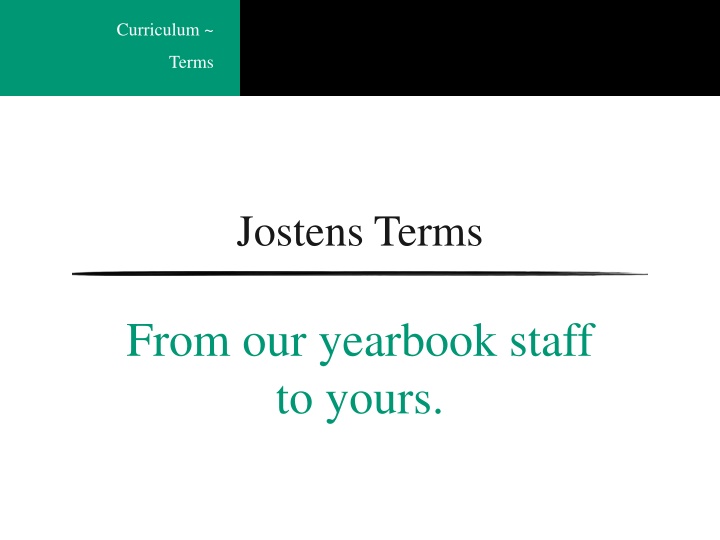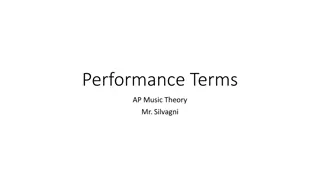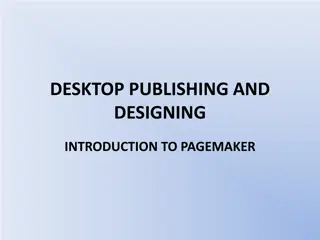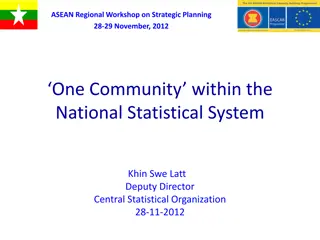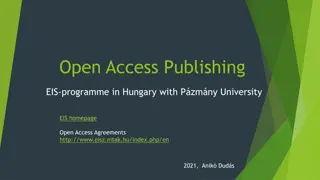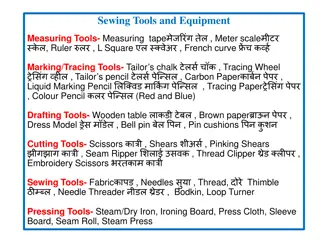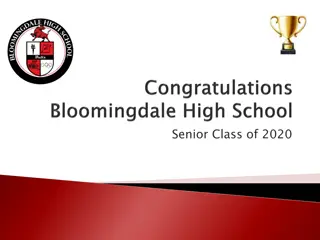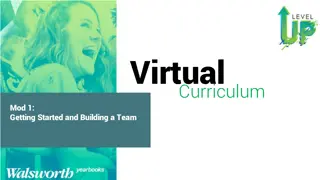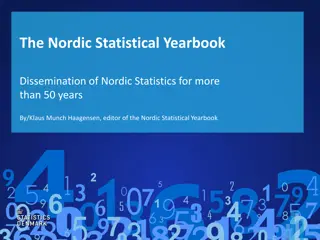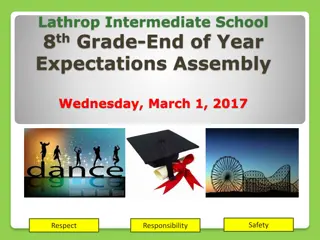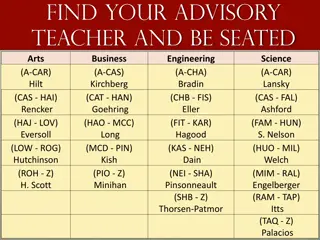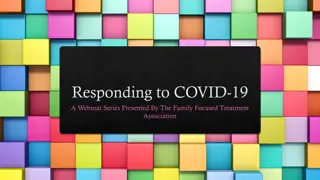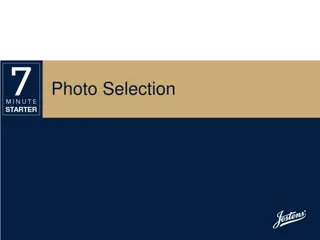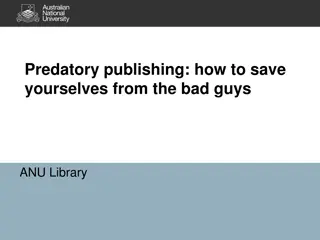Jostens Terms: A Comprehensive Guide to Yearbook Publishing Tools
Explore the essential terms and tools offered by Jostens for yearbook creation, including Yearbook Avenue, Tagging, Personalization, and more. Learn about the features such as Personal Ads, Dust Jacket, and Replay It to enhance your yearbook experience. With Jostens, empower your yearbook staff with the resources they need for a successful publication.
Uploaded on Sep 17, 2024 | 2 Views
Download Presentation

Please find below an Image/Link to download the presentation.
The content on the website is provided AS IS for your information and personal use only. It may not be sold, licensed, or shared on other websites without obtaining consent from the author.If you encounter any issues during the download, it is possible that the publisher has removed the file from their server.
You are allowed to download the files provided on this website for personal or commercial use, subject to the condition that they are used lawfully. All files are the property of their respective owners.
The content on the website is provided AS IS for your information and personal use only. It may not be sold, licensed, or shared on other websites without obtaining consent from the author.
E N D
Presentation Transcript
Curriculum ~ Terms Jostens Terms From our yearbook staff to yours.
Curriculum ~ What is Jostens? Terms The company that prints and publishes your yearbook Jostens Rep: your connection to the publisher, a wealth of information, and an advocate in completing deadlines, meeting budgets, planning, creating, etc. Jostens Plant Consultant: your connection in creation of your yearbook at the plant level. Jostens Tech Support: the call-in support system that can help you with any computer related issues.
Jostens Terms Curriculum ~ Terms Yearbook Avenue (YBA) Access to tools to create, sell, and promote your yearbook. YBA includes record keeping software, page generators, coverage reports, etc. to ensure your staff runs smoothly. Yeartech Online (YTO) Creation software that allows one to create their yearbook online. In YTO, one can assign logins and anywhere there is access to the internet, one has access to current pages of the yearbook for creation.
Jostens Terms Curriculum ~ Terms Tag The ability to mark photos with names of individuals who appear in the photos. Tagging photos allows for better coverage and easy indexing. Coverage Report An option on YBA that displays the number of times individuals appear in the yearbook (photos must be tagged) and the page numbers on which they appear. The coverage report also allows for easy access to correct spelling of names.
Jostens Terms Curriculum ~ Terms Personal Ads Ads created by individuals to celebrate a variety of events/purposes including graduation, friendship, accomplishments, etc. Widget An item placed on a school s website that can display a variety of things including yearbook commercials, slideshows, etc. QR Codes Barcodes that can be scanned via smartphones. The QR code then connects one to online content not included in the yearbook.
Jostens Terms Curriculum ~ Terms Personalization The opportunity for an individual to add his/her name or a short phrase to the front of his/her yearbook. Dust Jacket A clear plastic cover that can be placed around a yearbook to protect it from the elements.
Jostens Terms Curriculum ~ Terms Replay It A personalized site where photos can be submitted to a school for use in the yearbook. Schools need only give patrons of the school community the login/password combination to access, upload, and send photos to schools.
Your Assignment Curriculum ~ Terms In pairs, distribute the terms in this powerpoint amongst your staff evenly. Using a notecard for each term (ie: if you have three terms, you need three notecards), record each of the following information: The word A visual description of the word The word used correctly in a sentence Add your photos to the word wall
Yearbooking Terms Curriculum ~ Terms Yearbook Components Terms you should know to do your job right!
Design Elements Curriculum ~ Terms Headline Introduces the reader to the page by summarizing the story of the page or highlighting its focus. Should use literary devices to be clever or eye- catching. Feature Story Tells about the event and gives more insight and detail than a caption can.
Design Elements Curriculum ~ Terms Caption There are different types of captions (ident, summary, quote, expanded, collection, group), but all captions should tell the reader more about the photo than they can simply see.
Types of Captions Curriculum ~ Terms Id/ident: name and grade summary: who, what, when, where, why, how quote: first-person, word-for-word commentary expanded: in-depth, 5Ws & H, and direct quote collection: describe a photo package, can be idents group: idents by row
Photo Terms Curriculum ~ Terms Visual storytellers Types of Photos Dominant: The largest photo on the page, must be a strong emotional or action shot to catch the attention of the audience. Action: candids capturing the peak of action Reaction: candids illuminating emotional responses Scrapbook/environment: posed photos featuring unique personalities COB: cut-out background photo Selective Color: part black/white, part color photo
Curriculum ~ Page Elements Terms Folios These are page numbers and page information. They should go with your theme and add to the page. Byline The name of the author(s) of the spread/page Photo Montage/Collection A collection of photos, separated by very thin rails
Yearbook Basics Curriculum ~ Terms Coverage Reporting the story of the entire year for all students, staff, and community. Each student should appear in your book at least 3 times. Theme The unifying idea that has a visual and verbal element that holds the book together. The verbal might be a graphic or other design element.
Inside the Book Curriculum ~ Terms Page 1, Table of Contents, and Opening Consider placing the table of contents on the endsheet or page 1. Also, include school information and introduce your theme. Sports Section Highlights the athletic events of your school Academics Should highlight the exciting and interesting things going on in the classroom.
Inside the Book Curriculum ~ Terms Clubs/Organizations Records the happenings of the clubs that exist in your school (school sponsored and student sponsored) People School mug shots of all students and staff in the school. Student Life Highlights activities that take place in the lives of students in and outside of school
Inside the Book Curriculum ~ Terms Advertising/Community Section Showcases the businesses and families who support your book. Index A record of who is in the book and where the reader can find them. Might include photos for more coverage. Divider Pages/spreads that indicate new sections and provide continuity with your theme.
Emphasizing your theme Curriculum ~ Terms Opening Gives an introduction to your theme and starts the book out on that note. Closing Finishes the story of the year and brings the book closure.
Putting it together Curriculum ~ Terms Ladder Page-by-page outline or blueprint of the stories to be covered in the yearbook which includes: Multiples: Eight pages on one side of a press sheet, indicated by shading on the ladder; color is purchased in multiples. Multiples are designated by different colors on the ladder. Signatures: Groupings of pages that are printed on the same press sheet and folded into 16-page mini-booklets; signatures are then bound together to make a complete book. Signatures are equal to two multiples.
Putting it together Curriculum ~ Terms Page A single page of content with the opposite page featuring a different, yet often related topic. Double Page Spread (DPS) Two facing pages presenting a variety of elements to tell a story.
Your Assignment Curriculum ~ Terms In pairs, distribute the terms in this powerpoint amongst your staff evenly. Using a notecard for each term (ie: if you have three terms, you need three notecards), record each of the following information: The word A visual description of the word The word used correctly in a sentence Add your photos to the word wall
Curriculum ~ Terms Design Terms
Overview Curriculum ~ Terms Layout (template for each page) Structure (column division) Dominance (focal point of the page) Contrast (visual interest created by variety) Eyeflow/Eyeline (keeps the reader interacting w/content) Linkage (visually links two facing pages) These elements should be a part of the page designing process.
Elements of Design Curriculum ~ Terms White Space Planned open space on a page used to frame or otherwise highlight content. Layout The layout is the template for your pages. It organizes all your design elements so that you can place them later. Structure By using columns and guides, your pages will be uniform and even.
Elements of Design Curriculum ~ Terms Dominance Each page should have a dominant element on the design. This may be a photo or a connected group of photos. Contrast Try to mix up elements and sizes of photos on your page to create contrast and variety, increasing reader appeal. Eyeflow/Eyeline This is the invisible (or white space created) line that runs across the DPS, helping connect the two pages and keeping the reader s visual flow.
Elements of Design Curriculum ~ Terms Linkage Each DPS should be designed as one unit, not two separate pages. Linkage helps readers stay on the pages longer and make things look more unified.
Your Assignment Curriculum ~ Terms In pairs, distribute the terms in this powerpoint amongst your staff evenly. Using a notecard for each term (ie: if you have three terms, you need three notecards), record each of the following information: The word A visual description of the word The word used correctly in a sentence Add your photos to the word wall
